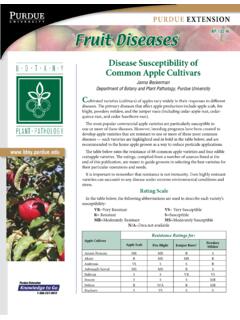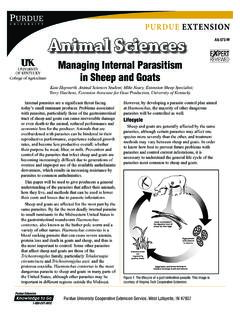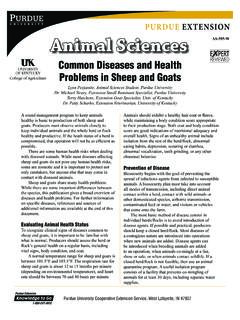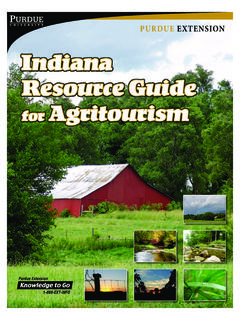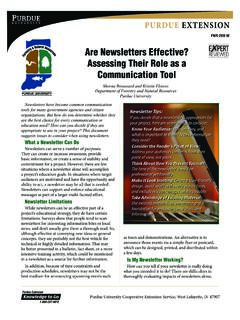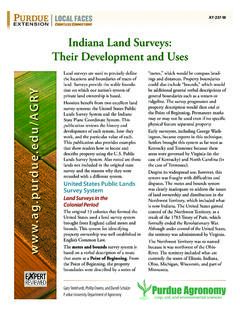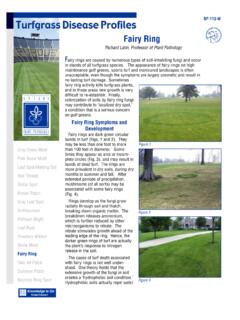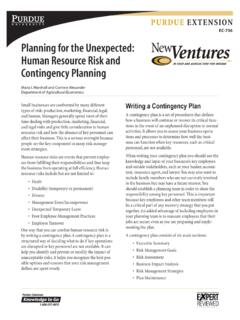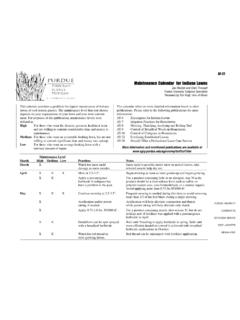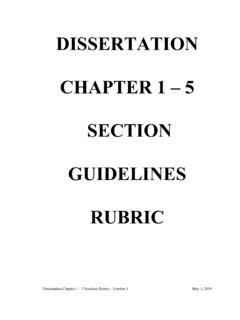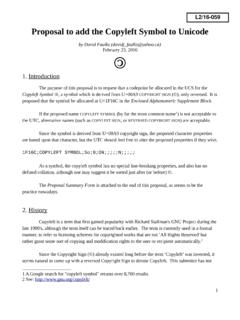Transcription of Writing a Successful Grant Proposal
1 P u r d u e e x t e n s i o nEC-737 Writing a Successful Grant ProposalMaria I. MarshallDepartment of Agricultural EconomicsPurdue UniversityAaron JohnsonDepartment of Agricultural and Resource EconomicsOregon State UniversityJoan FultonDepartment of Agricultural EconomicsPurdue UniversityAudience: Business managers seeking Grant funding to support their business activitiesContent: Explains the steps involved in completing a Successful Grant Proposal and presents specific examples for new business venturesOutcome: Readers will understand the necessary steps in Writing a Successful Grant many people, applying for a Grant is a mysterious process. You may have the feeling that those who are Successful and receive grants are either lucky or have inside connections.
2 But Grant Writing does not have to be mysterious. In most cases, grants are awarded based on a careful review process with criteria that everyone has access to. In this publication, we help you break down the mystery of preparing a more competitive Grant application. In the following sections, we outline the steps you need to complete. The examples that we use in this publication are oriented towards grants to assist new business ventures. But because the steps to completing a Successful Grant Proposal are the same for all grants, this publication will be useful even if you are considering a Grant in another area. At the end of the publication, you will find a series of worksheets to help you with the process of Writing a Successful Grant a Good FitLet s face it when you are applying for a Grant you are asking an agency for money.
3 Agencies generally award funding to solve problems or address issues that are important to them. Therefore, to maximize your chance of success, be sure your Proposal indicates you will be addressing a problem or improving a situation the agency funding the Grant thinks is are different ways to ensure a good fit between your Proposal and the funding agency. First, you are off to a great start if your goals are consistent with the agency s goals. Next, check the call for proposals (sometimes called request for proposals [RFP] or notice of funds available [NOFA]). In the remainder of this publication we use the phrase call for proposals. Purdue Extension Knowledge to GoCheck and see if the objectives for this particular Grant coincide with your objectives.
4 Keep in mind that there are different objectives. For example, sometimes job creation is the goal, while another time increased regional income is the focus. While job creation and increased regional income are related, it is possible to have higher income in the region with no new jobs. Therefore, it is critical that you identify what outcomes are important for this agency and this Grant Proposal and make sure your Proposal addresses these objectives. So, what do you do if your project is not a good match for a particular agency and Grant ? Sometimes, you may be able to effectively change your Proposal to meet the expectations of the funding agency. But be careful! It is easy to fool yourself into believing you have made all necessary changes to fit the call for proposals.
5 However, the people reviewing the proposals can quickly figure out that you are really trying to fit a square peg in a round hole and place your Proposal towards the bottom of the , be sure to protect your integrity. Determine what your goals are and what you want to do. Make sure that the Proposal you submit is consistent with your goals. If you have to adjust your Proposal so much that you sacrifice your core goals and objectives, you will not only have tarnished your integrity, but you won t be Successful in the long your Proposal is not a good fit for the Grant , look for other funding sources rather than prepare a Proposal with little chance of success. Just because you decide not to develop a Proposal now does not mean that you have given up on your project .
6 You are simply looking for another funding source that is a better PreparationBefore you begin to write your Proposal , there are several steps you should take to prepare. Although the temptation is strong to immediately begin Writing , your Proposal will be much more effective if you do some homework Goals and Objectives of the ProgramBegin by determining the priority areas of the funding agency. Carefully examine the call for proposals, because the goals and objectives of the specific Grant are often explicitly listed there. Also, pay attention to what the granting agency is doing and what they are saying publicly. Take a look at recent press releases from the funding agency. Review recent speeches or public presentations given by leaders from that agency.
7 You will gain important insight about their priorities. Of course you don t have to follow through on every one of the above suggestions, but gathering background information from different sources is a useful way to identify the goals of the program. When you have a clear sense of what the agency values, you can adapt your Proposal accordingly. We have provided a worksheet to help you capture the agency s goals and objectives, and determine how your Proposal fits them (Agency s Goals worksheet, p. 7).Example: Jane s WineryJane owns a small winery. Her business currently involves a vine-yard and wine production. All of her current sales are through distributors. She would like to open a tasting room and sell her wine directly to consumers, but she is not sure if there is suf-ficient consumer demand to be Successful .
8 Jane is going to apply for a Grant from a government agency to fund market research to determine the market feasibility of her business call for proposals from the government agency is as follows:The objective of this research is to identify an array of innova-tive marketing strategies to increase sales of agricultural and related products. The research will assess and evaluate the type, size, and location of market opportunities and enable the decision maker to develop strategies to gain entry into these markets. Examples of appropriate topics for research include, but are not limited to: Assessment and Specifica-tion of Marketing Opportunities, Development of Marketing Systems, and Development of Innovative Real-Time Jane s project involves the assessment and specification of the market potential for direct sales of wine from a tasting room, it is a very good fit for this funding agency.
9 This is further confirmed after she watches a Webcast of a presentation by the program administrator and during a brief phone conversation with the program director. Knowing that her interests align well with the program, she is now curious as to how well her proposed idea will score with the Proposal reviewers. Purdue Extension Knowledge to GoList Proposal Evaluation CriteriaMost grants have specific criteria that the reviewers use for evaluating all of the proposals. These criteria are often explicitly stated in the call for proposals. Reviewers are instructed to evaluate all of the proposals accordingly. In some instances, the number of points that the reviewers could potentially assign to each criterion is also listed. Make sure that your Proposal matches the criteria set out by the funding you are preparing your Proposal , pay careful attention to these criteria.
10 Put yourself in the position of a reviewer, and evaluate how well you would rate your Proposal according to each criterion. We have provided a worksheet for you to list the evaluation criteria and rate your own Proposal based on them (Evaluation Criteria worksheet, p. 8). Seek ClarificationWhen you first read the call for proposals, you may have the feeling that it is filled with jargon, and, if so, you are not alone. Grant programs often have a set of definitions and language that are unique to that program. To assist you, there is usually a list of definitions somewhere in the call for proposals. After reviewing the list of terms, you may have questions about terminology, as well as other aspects of the Grant . If so, write them down. Once you have your questions written down, you are ready to call or e-mail the contact person at the funding agency.
